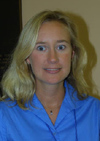MUSC Gives Back Award
Marine life, volunteering a match for student
by Cindy AbolePublic Relations
Graduate Studies student Maggie Holbrook’s love for the ocean and marine life has taken her to depths that others see as unfathomable. Not only does she work full-time as a research chemist at National Oceanic and Atmospheric Administration's Center for Coastal Environmental Health and Biomolecular Research (CCEHBR), but Holbrook volunteers as a diver at the South Carolina Aquarium’s Great Ocean Tank.
 “Working
there is such an incredible experience,” said Holbrook, who is a bioinformatics
student in the Department of Biometry and Epidemiology. “Everyone who works
there loves it.”
“Working
there is such an incredible experience,” said Holbrook, who is a bioinformatics
student in the Department of Biometry and Epidemiology. “Everyone who works
there loves it.”
Holbrook has been an aquarium volunteer for more than a year. In April, she became one of six MUSC Gives Back Outstanding Student Volunteer Award winners representing the College of Graduate Studies. Each individual winner was recognized for volunteer hours served during the academic year.
An experienced diver, she began working at the aquarium as an aquarist assistant and was encouraged to work with other volunteers with the Great Ocean Tank. Volunteers prepare and feed more than 350 species of fish and other marine animals including sharks and sea turtles. They also perform tank cleaning and participate with visitor education about scuba diving and shark and reef awareness.
A marine conservationist, Holbrook has previous experience volunteering with Cape Romain National Wildlife Refuge’s Nest Relocation Program for Loggerhead Sea Turtles. She recently became a Professional Association of Diving Instructors rescue diver and completed NOAA scientific diver certification, which led to an eight-day research cruise to Gray’s Reef National Marine Sanctuary aboard the Nancy Foster.
“Our volunteer divers are a big asset to our programs,” said Arnold Postell, dive safety officer for the South Carolina Aquarium. “They are our main workforce. We feel we have lots to offer to anyone who loves diving and wants to maintain or increase their skills.”
Postell maintains about 80 volunteer divers for the Great Ocean Tank. Divers must possess advanced certification in diving and work a minimum of 16 hours (two 8-hour shifts) per month.
Holbrook enjoys this new level of volunteering. She has met other dive enthusiasts in the area and has learned about marine animal husbandry. She hopes to spend more of her time with school programs and tank education.
“I’ve worked with adult and child reading programs and enjoy all
the teaching aspects of it,” she said. “This level of hands-on volunteer
work has been great.”
Catalyst Online is published weekly, updated as
needed and improved from time to time by the MUSC Office of Public Relations
for the faculty, employees and students of the Medical University of South
Carolina. Catalyst Online editor, Kim Draughn, can be reached at 792-4107
or by email, catalyst@musc.edu. Editorial copy can be submitted to Catalyst
Online and to The Catalyst in print by fax, 792-6723, or by email to petersnd@musc.edu
or catalyst@musc.edu. To place an ad in The Catalyst hardcopy, call Community
Press at 849-1778.